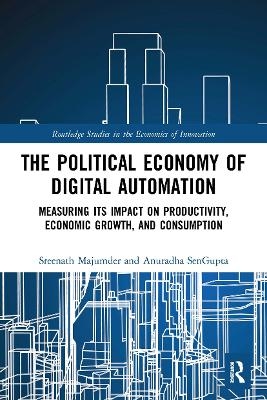
The Political Economy of Digital Automation
Measuring its Impact on Productivity, Economic Growth, and Consumption
Seiten
2022
Routledge (Verlag)
978-0-367-54122-4 (ISBN)
Routledge (Verlag)
978-0-367-54122-4 (ISBN)
With digital automation becoming ubiquitous, the relationship between man and machine is being redefined. This book, through a focus on America, identifies the tension this relationship has produced, and how it has divided America.
With digital automation becoming ubiquitous, the relationship between man and machine is being redefined. This book, through a focus on America, identifies the tension this relationship has produced, and how it has divided America socially, politically, and economically, ultimately breeding two fundamentally incompatible nations within one: the “forgotten America” and “elite America.”
This book enables the reader to visualize the changes brought by automation on our producer and buyer identities, and suggests policy changes that global leaders could adopt to deal with the increasing discord. The book is heavily dependent on a few fundamental concepts of both economics and sociology, such as globalization, labor economics, and cultural homogenization.
The book is ideally suited to students and academics researching political economics and sociology, with focuses on globalization, unemployment, and the social impacts of technological advances.
With digital automation becoming ubiquitous, the relationship between man and machine is being redefined. This book, through a focus on America, identifies the tension this relationship has produced, and how it has divided America socially, politically, and economically, ultimately breeding two fundamentally incompatible nations within one: the “forgotten America” and “elite America.”
This book enables the reader to visualize the changes brought by automation on our producer and buyer identities, and suggests policy changes that global leaders could adopt to deal with the increasing discord. The book is heavily dependent on a few fundamental concepts of both economics and sociology, such as globalization, labor economics, and cultural homogenization.
The book is ideally suited to students and academics researching political economics and sociology, with focuses on globalization, unemployment, and the social impacts of technological advances.
Sreenath Majumder is an associate professor of Economics at Manchester University, Indiana, USA. Anuradha SenGupta is an advisory manager at EY, Australia, with extensive international experience in both public and private sectors.
1. The Great Divergence—The Common Crises; 2. The Great Divergence—The Rise of Digital Automation (Digitomation); 3. The Great Divergence—The Effect of "Digitomation" on the Labor Market (We the Seller); 4. The Great Divergence—Flattening Demand (Buyer Identity); 5. The Divergence: We the Sellers vs. We the Buyers; 6. The Great Divergence—Policy Options to Counter the Divergence; 7. Conclusion
| Erscheinungsdatum | 21.04.2022 |
|---|---|
| Reihe/Serie | Routledge Studies in the Economics of Innovation |
| Zusatzinfo | 13 Tables, black and white; 33 Illustrations, black and white |
| Verlagsort | London |
| Sprache | englisch |
| Maße | 156 x 234 mm |
| Gewicht | 208 g |
| Themenwelt | Informatik ► Theorie / Studium ► Künstliche Intelligenz / Robotik |
| Wirtschaft ► Volkswirtschaftslehre ► Makroökonomie | |
| ISBN-10 | 0-367-54122-X / 036754122X |
| ISBN-13 | 978-0-367-54122-4 / 9780367541224 |
| Zustand | Neuware |
| Haben Sie eine Frage zum Produkt? |
Mehr entdecken
aus dem Bereich
aus dem Bereich
Buch | Softcover (2024)
REDLINE (Verlag)
CHF 27,95
Eine kurze Geschichte der Informationsnetzwerke von der Steinzeit bis …
Buch | Hardcover (2024)
Penguin (Verlag)
CHF 39,20


